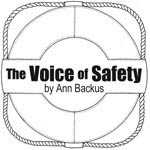Fishermen, Farmers, and Forestry Workers at Risk in FY 2012 Budget?
by Ann Backus

Ann Backus, MS is an Instructor in Occupational Health at Harvard School of Public Health, 665 Huntington Ave., Boston MA 02115, 617/432-3327, abackus@hohp.harvard.edu
Fishermen, farmers, and forestry workers in Maine and throughout New England will no longer benefit from occupational safety research in these industries if the President’s FY 2012 budget is passed in its present form. This budget calls for the elimination of the Education and Research Centers (ERCs) and of the Agriculture, Fishing, and Forestry Centers (AFF) across the country; this includes 17 ERCs and 8 AFFs. These Centers are programs within the National Institute for Occupational Safety and Health (NIOSH – a national research institute) that educate health and safety professionals, undertake research to reduce injury and fatalities, and provide outreach to workers at the local level. In the Northeast, the ERC is located at Harvard School of Public Health and the AFF is located in Cooperstown, New York. Both serve the entire New England region.
Over the past 12 years, the Harvard ERC has been extremely active in the Maine fishing industry having provided over $40,000 for research on lobstermen’s entanglement in trap rope, lobstermen’s workshop exposures on Vinalhaven, and most recently on exposure to diesel exhaust before and after diesel engine repowering in the lobster fishery. Ann Backus, the Director of Outreach at the Harvard ERC, is an active member of Maine Commercial Fishing Safety Advisory Council, participates every year in the Fishermen’s Forum in Rockport, and writes fishing safety articles bimonthly for Commercial Fisheries News and Fishermen’s Voice that bring current safety ideas and the results of safety research to the attention of Maine fishermen. The collaboration among the Harvard ERC, the US Coast Guard District I, the Marine Safety Office Portland, and the Maine Marine Patrol may be at least partially responsible for there having been 19 fewer fishing fatalities in the Northeast between 2001-2009 than in the prior eight years, 1993-2001.
The Harvard ERC has also brought significant resources to Maine through the sponsorship of three major photography exhibits in Maine by nationally known photojournalist Earl Dotter in an effort to raise awareness of occupational safety and health: The Quiet Sickness, Portland, 2000; The Price of Fish, multiple venues, 2002; and Farmworkers Feed Us All: The Labor and Health of Migrants in Maine, Augusta, 2008. This later exhibit is available at www.migrantclinician.org/ gallery.html. In addition Mr. Dotter provided photographs of Maine forestry work for the Maine Employers’ Mutual Insurance Company (MEMIC) annual report, 2003.
The New York-based AFF, or Ag Center as it is also known, sponsors the Northeast Community Collaborations for Farmworker Health and Safety and networks this with existing community-based migrant worker initiatives in Maine and New York.
Basically, the FY 2012 budget calls for the elimination of the training and research relevant to those workers who are the backbone of our economy – the fishers, farmers, and foresters. Their health and longevity will suffer significantly in the long run while those who sit in the glassed-in offices will continue to be free of toxic exposures and far-removed from unsafe equipment. Senator Susan Collins (R, ME) as a member of the Senate Appropriations Committee, has a voice and a vote on this budget. In order to continue research and outreach activities in Maine like those outlined, we need many people to contact Senator Collins by going to her website (letters get very delayed) and filling-in the simple email form. Please include your own text and the following “in the FY 2012 I request that you advocate for and vote to restore funding of the NIOSH ERCs and Ag Centers (AFFs) to 2010 levels.” Thank you!
Ann Backus, the Director of Outreach at the Harvard ERC, is an active member of Maine Commercial Fishing Safety Advisory Council, participates every year in the Fishermen’s Forum in Rockport, and writes fishing safety articles bimonthly for Commercial Fisheries News and Fishermen’s Voice that bring current safety ideas and the results of safety research to the attention of Maine fishermen. The collaboration among the Harvard ERC, the US Coast Guard District I, the Marine Safety Office Portland, and the Maine Marine Patrol may be at least partially responsible for there having been 19 fewer fishing fatalities in the Northeast between 2001-2009 than in the prior eight years, 1993-2001.
